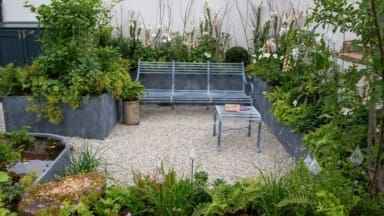
According to Airbnb, there are currently over 5 million Airbnb hosts worldwide, translating to over 7.7 million active listings on the platform. The company boasts more than 150 million worldwide users, whom have booked over 1.5 billion stays with over 5 million Airbnb hosts. Europe has the most listings overall, with 4.84 million (2021), Asia Pacific 2.21 million and North America 2.55 million. The UK accounts for over 500,000 listings.
With the number of Airbnb listings in the UK having quadrupled over the last six years and a reported 1 in 4 properties in some parts of Britain now listed on the site, the Society of Garden Designers (SGD) fears that the desire for low-maintenance gardens is leading to a rise in the use of environmentally-damaging materials such as plastic grass, as well as the inclusion of large expanses of patio at the expense of greenery.
The SGD acknowledge that Airbnb already offers advice to hosts on how to make their homes more sustainable, including ways to improve energy, heating and water usage efficiency indoors, but gardens are overlooked. With rental gardens also increasingly featuring ‘resort style’ features such as hot tubs, firepits and outdoor kitchens, the SGD believes that the need for guidance on how to reduce the carbon footprint in your outdoor space is crucial.
By means of the SGD Green & Easy Garden Checklist, AirBnB can explain to hosts how they can create a low-maintenance garden that can benefit wildlife and the environment and still incorporate the outdoor features holiday renters have come to expect. The checklist includes advice pertaining to; Balancing paving with plants for biodiversity; natural alternatives to the environmentally damaging plastic grass; rethinking outdoor amenities (hot tubs, saunas, BBQ areas, outdoor kitchens) to reduce carbon footprint; low maintenance planting palettes; reusing and recycling materials.
Andrew Duff MSGD, Chair of the SGD said: “Living in a more sustainable, environmentally-conscious way is something many of us are already doing in our homes but we can also live greener existences through our gardens. Low-maintenance gardens shouldn’t mean plastic grass and paving, and incorporating outdoor amenities, such as outdoor kitchens, should always be done with sustainability and nature in mind. That applies not just to holiday homes but to anyone looking for an easy-to-maintain garden and to landlords creating gardens for long-term tenants.”
Garden designer Zoe Claymore who designed the 2023 Wildlife Trusts Renters’ Garden for the RHS Hampton Court Garden Festival said “If we aren’t looking after the millions of rented gardens in the UK, how can we hope to effectively manage climate change, heat islands and flash flooding?”
The SGD is the only professional association for garden designers in the UK and counts some of the UK’s leading garden and landscape designers among its growing membership. In 2023, the SGD ran the Say No To Plastic Grass campaign supported by the Royal Horticultural Society, highlighting the extreme environmental damage and decline in wildlife caused by the growing trend for plastic grass and encouraging millions of homeowners, gardeners and garden designers to look for alternative natural solutions for their gardens.

